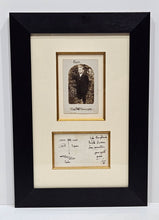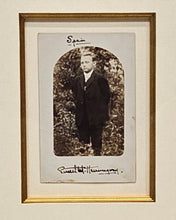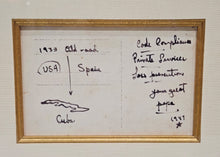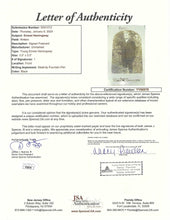ERNEST HEMINGWAY TREASURE ~ RARE DOUBLE HAND SIGNED AND ILLUSTRATED POSTCARD!
Regular price
$0.00
Sale
RARE hand-signed and illustrated postcard from Ernest Hemingway.
A photograph of a young Hemingway in which Hemingway wrote Spain above it.
Reporting on the war and traveling through Spain during a time of upheaval in the late 1930's formed the basis of inspiration for Hemingway’s highly regarded work, " For Whom the Bell Tolls ", as well as his one and only full-length play, " The Fifth Column ".
While Hemingway’s war reporting in Spain garnered him much fame, Hemingway’s link to Spain is probably best remembered as one of bullfights and matadors.
Ernest Hemingway hand-signed with a steel-tip fountain pen below the photograph. His signature has been James Spence authenticated.
Framed with a presentation photograph of the reverse side of the postcard with Hemingway's illustration.
Ernest Hemingway was multi-layered and complicated, which is reflected by his personal notations and drawing on the postcard and possible references to his life. His sketch depicts the turmoil in 1933 with his writings and subsequent travels and living in the US, Spain and eventually settling in Cuba.
1933
" A Farewell to Arms ", published in 1929, was a total negation of warfare - including a heroine who died giving childbirth after a wartime romance. In 1933, the Nazis, who glorified wartime struggles, burned in mass, copies of his book translated in German " In einem anderen Land ".
CODE COMPLIANCE
Hemingway’s definition of code hero is: “A man who lives correctly, following the ideals of honor, courage and endurance in a world that’s sometimes chaotic, often stressful, and always painful.” He measures himself by how nicely he handles the troublesome conditions that life throws at him.
PRIVATE SERVICES
Hemingway was extremely sensitive about his private life, which he described as " an open sewer ". He complained to his editor, insisting that his publisher must " at once remove that biographical crap ie shit about me on the back wrapper ".
LOSS PREVENTION
The Poetics of Loss
Basic motives of Hemingway's work (in particular his early and late periods), are: the fear of imminent loss, change, mutability, time, and the end of something.
Hemingway knew that alcoholism interfered with his commitment to taking writing seriously and treating it like a job. He committed suicide ravaged by alcoholism complicated by psychosis.
1949
The period between 1949 and 1950 culminates in the publication of " Across the River and into the Trees ", which was Hemingway's literary comeback. He had not written or published anything in ten years. Interactions with editors and friends during 1949 shows a clouded sense of reality combined with a strong literary ego.
He affectionately signs the postcard " Your Great Papa " which reflects his ego at the time.
Measures approx.13 1/2" x 19 1/2" archivally framed with a cream linen matte, gold filet and black frame.








